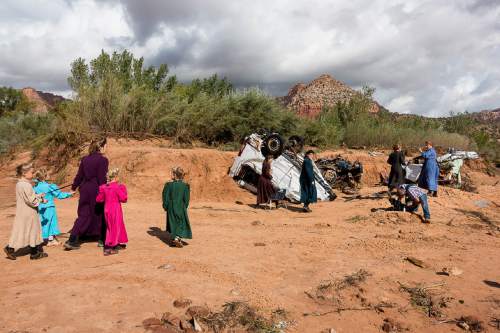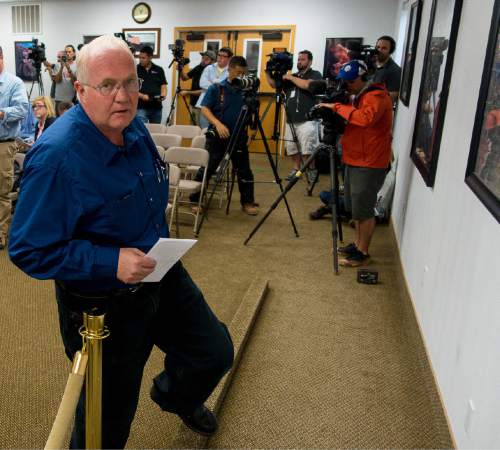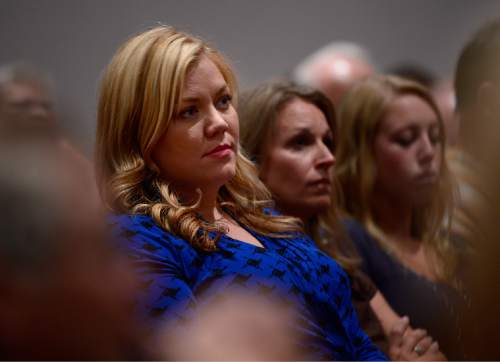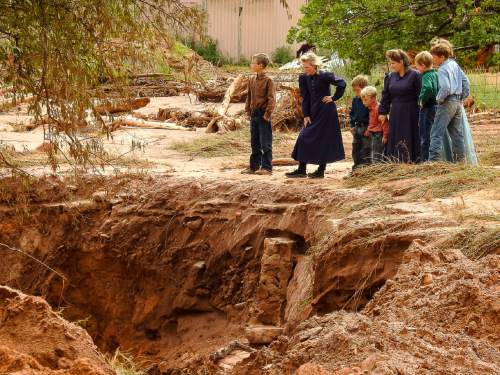This is an archived article that was published on sltrib.com in 2015, and information in the article may be outdated. It is provided only for personal research purposes and may not be reprinted.
The trust that owns much of the real estate in Hildale, Utah, and Colorado City, Ariz., says it will pause the evictions of residents who have not paid to live in homes there.
Jeff Shields, an attorney for the United Effort Plan, said he doesn't know how long the eviction proceedings will be halted. He said the pause is out of deference to the flash flood that killed 12 people in Hildale on Sept. 14.
A 13th person, Tyson Lucas Black, age 6, remains missing. A search for his body resumed Tuesday.
"We're hoping they can find that body and kind of have some closure," Shields said Tuesday morning.
He said the decision to halt evictions — both those already in court and new evictions the trust planned to pursue — was made the day after the flood. Shields and other trust staff were contemplating a pause that day, he said, when an assistant Utah attorney general called and requested they do so.
Missy Larsen, a spokeswoman for Utah Attorney General Sean Reyes, said in an email Tuesday that the office asked for evictions "to hold off until the community has time to mourn the recent losses."
Hildale and Colorado City, collectively known as Short Creek, are the home of the polygamous Fundamentalist Church of Jesus Christ of Latter-Day Saints. In 1942, members formed the United Effort Plan, or "UEP," to hold most of the homes and commercial and agricultural real estate in Short Creek. Those people who consecrated property to the trust were listed as beneficiaries with their descendants entitled to inherit those benefits.
In 2005, the state of Utah seized the UEP out of concerns that FLDS President Warren Jeffs was mismanaging it. The UEP began requiring residents to sign occupancy agreements and pay $100 a month to live in one of the trust's homes.
Jeffs has forbidden his followers from signing or paying, and even some who no longer follow Jeffs have refused to pay the $100 because they don't like that much of the money is paying for UEP attorneys.
The Utah judge who oversees the UEP last year approved a plan to begin evicting residents who don't pay. Dozens of eviction notices have been served on homes in Hildale. Far fewer have been served in Colorado City because most lots there are not subdivided, meaning entire blocks appear as one parcel at county offices.
The evictions gained attention in the days after the flood. Two men whose families were killed, Joseph N. Jessop, and Sheldon Black, Jr., made statements implying their families had been evicted. The UEP has said there's no record of those families being forced to move.
Shields said the UEP was about to serve eviction notices on about 40 more homes before the pause. He said many of those homes have occupants who were paying their fees but stopped. Shields hoped the notices would spur the occupants to begin paying again and there would be no need to proceed with an eviction.
Shields said the eviction notices have been effective in getting people to pay and in providing homes to people who are beneficiaries of the UEP.
"Every house where we evict, we move somebody else in," Shields said.
Twitter: @natecarlisle —
Oral arguments to be heard in child bride case
The Utah Supreme Court on Nov. 5 will hear arguments about whether a former child bride can sue the United Effort Plan.
Elissa Wall, who filed the lawsuit under the name "MJ" because she was 14 at the time of her marriage, wants to hold the UEP liable for the conduct of her former husband and Warren Jeffs. A lower court judge ruled the case can go to trial. Lawyers for the UEP appealed that ruling, arguing the trust shouldn't be held liable for the actions of a few rogue trustees and that when Wall signed a settlement agreement with her former husband, that should have released the trust of liability, too.
Wall's lawyers have said they would seek as much as $40 million at trial.













